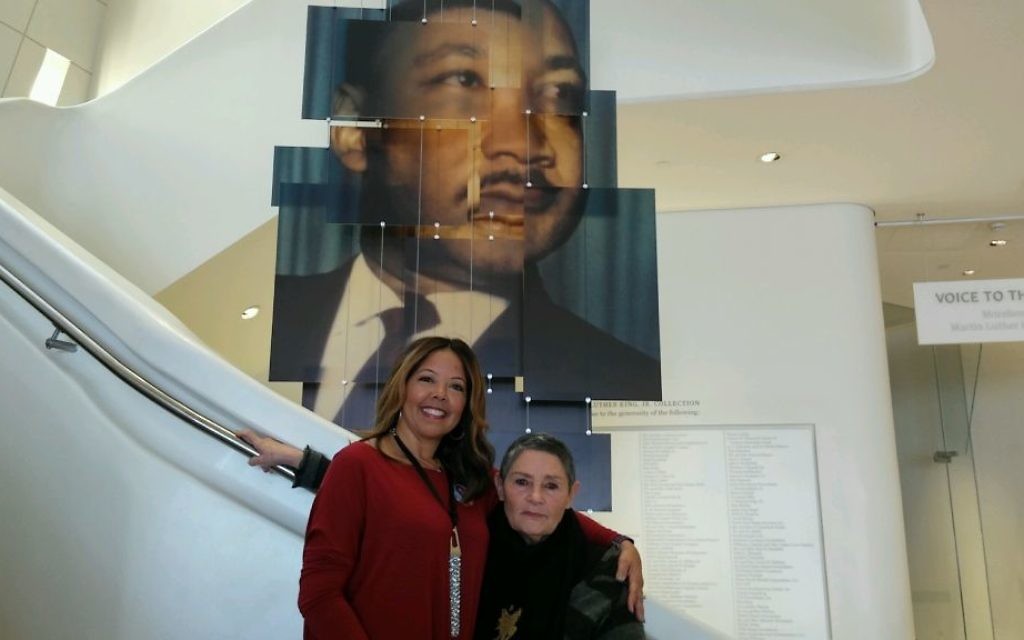Children’s Deaths Unite Moms Across Cultures
Robi Damelin brings Parents Circle Families Forum stateside
An Israeli-Palestinian movement of mothers who have lost sons to the conflict is connecting with American mothers whose sons have been killed to form a united front against gun violence.
Israeli Robi Damelin founded Parents Circle Families Forum, an organization for bereaved Palestinian and Israeli families, after a Palestinian sniper killer her son David. She was angry, but she’s trying to channel that energy to do good.
“Right now is the most important time to use your voice for change,” she said. “You have to talk to people you don’t like or agree with; if not, they only become more radical.”
Get The AJT Newsletter by email and never miss our top stories Free Sign Up
Damelin brings together other mothers who have lost sons to gun violence and hate.
She recently spoke about PCFF at the National Center for Civil and Human Rights with Lucia McBath, the mother of Jordan Davis, the 17-year-old killed in Florida by Michael Dunn in 2012 for playing loud music at a gas station.
Damelin decided to reach out to McBath after seeing the black mothers who appeared onstage at the 2016 Democratic National Convention because gun violence, including police shootings, killed their children.
McBath said it was time to connect with other mothers.
“I could feel it in my spirit: Gun violence — bereaved mothers, fathers and families — is a global crisis,” she said. “We want to change gun laws to make safer spaces for our families, but peace and reconciliation are our next steps.”
McBath described in detail the events that led to her son’s death. She said she forgave Dunn, who was convicted of first-degree murder and three counts of second-degree attempted murder.
“Michael Dunn is in prison for the rest of his life without parole. He will never be able to experience the love of his family. His family will forever suffer,” McBath said.
“I asked the Lord, ‘Why did this happen to my child?’ But I stopped asking why and asked, ‘Who am I? And now what am I going to do with this?’ ” she said. “I knew I was being called to do something beyond myself and Jordan.”
You can pass gun laws and even end a holy war, Damelin said, but first you need a process of reconciliation.
She said being pro-Israel or pro-Palestinian only feeds the perceived hatred between Muslims and Jews. She forgave the man who killed her son after going through a lengthy process to understand that forgiveness means giving up revenge and pursuing peace instead.
“We have to be about the business of preserving each other’s lives,” Damelin said. “If you know about Israel and Palestine, there’s a cutoff, and we do not know each other. I imagine it’s the same thing here in America. You don’t know each other. You’re not at war, but sometimes I wonder if you are.”
When mothers who have lost children come to the Parents Circle, there’s a bonding, she said. Listening to one another’s stories humanizes everyone.
Damelin said it’s crucial to give Palestinian mothers space for healing because they have few outlets.
“First they describe what happened in detail, and then they say their child’s name. This is when you start to humanize them,” Damelin said. “We have the same pain but disagree with each other’s national narrative.”
To address the dissonance, the Parents Circle uses education about the Holocaust and about the conflicting views of Israel’s establishment in 1948.
“For Palestinians, 1948 is the nakba, or catastrophe, and for Israel it marks our independence,” Damelin said. “We’re talking about the same date. You don’t become MLK at the end, but recognizing how a person sees history is a big tool for ending conflict.”
Her organization holds an Alternate Veterans Day for Israeli and Palestinian families to honor their fallen soldiers together. When it began, it drew 200 people; now it gets more than 5,000.
Willa Shallit, who is on the board of American Friends of the Parents Circle Families Forum, said she became involved because PCFF’s approach rises above the media, politics and hate.
“Someone who has lost their child is the ultimate authority. Out of every approach to peace in the region, I feel this approach is the most powerful,” Shallit said. “If we try to solve the problem with the same system that created it, we’re never going to solve the issue. We have to come from outside the box.”





comments